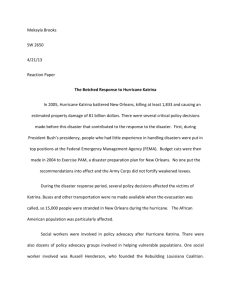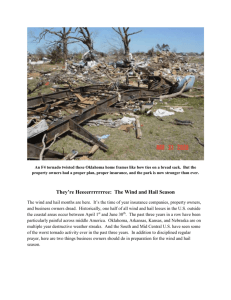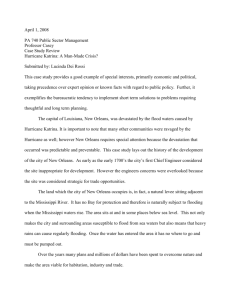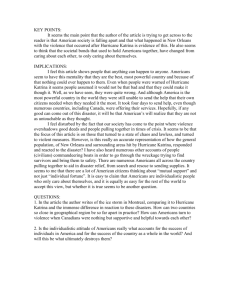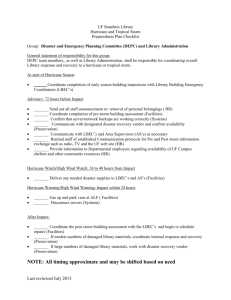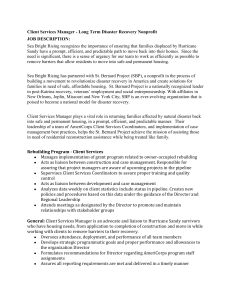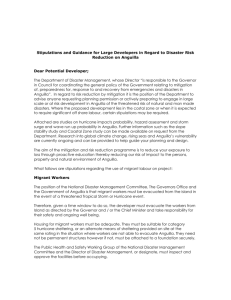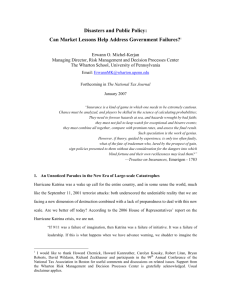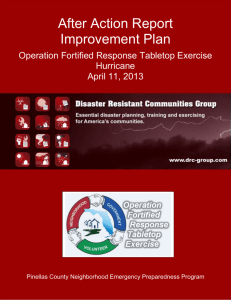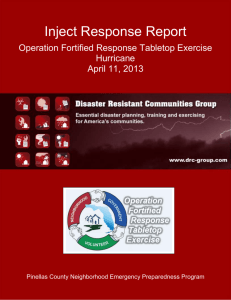Hurricane Preparation Checklist
advertisement
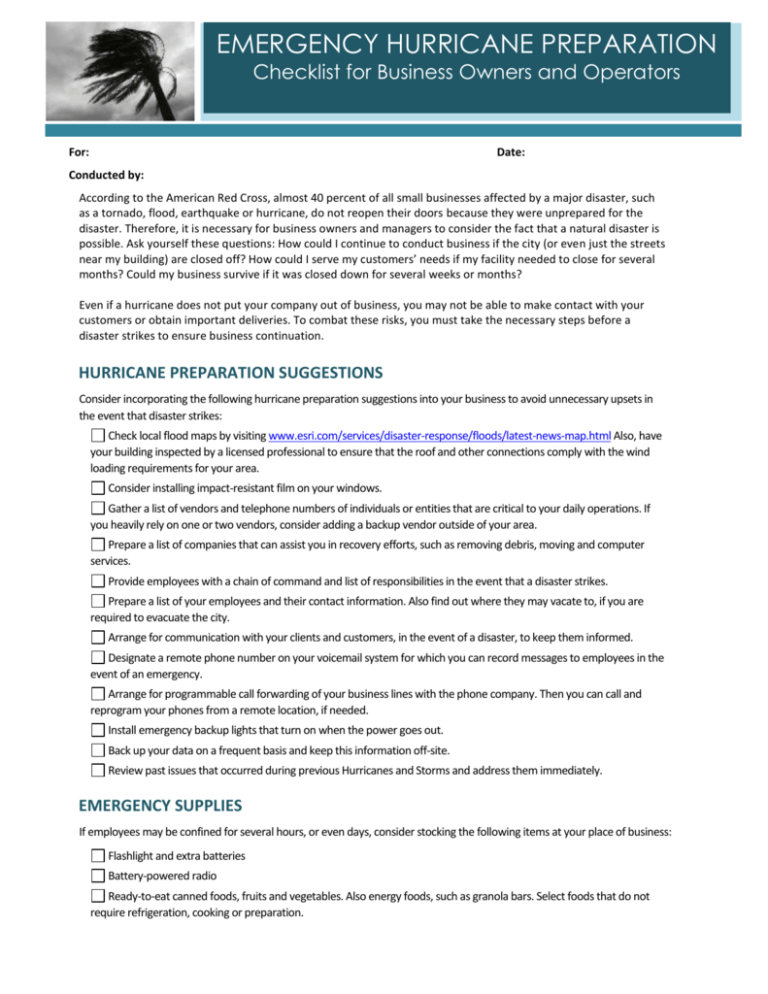
EMERGENCY HURRICANE PREPARATION Checklist for Business Owners and Operators For: Date: Conducted by: According to the American Red Cross, almost 40 percent of all small businesses affected by a major disaster, such as a tornado, flood, earthquake or hurricane, do not reopen their doors because they were unprepared for the disaster. Therefore, it is necessary for business owners and managers to consider the fact that a natural disaster is possible. Ask yourself these questions: How could I continue to conduct business if the city (or even just the streets near my building) are closed off? How could I serve my customers’ needs if my facility needed to close for several months? Could my business survive if it was closed down for several weeks or months? Even if a hurricane does not put your company out of business, you may not be able to make contact with your customers or obtain important deliveries. To combat these risks, you must take the necessary steps before a disaster strikes to ensure business continuation. HURRICANE PREPARATION SUGGESTIONS Consider incorporating the following hurricane preparation suggestions into your business to avoid unnecessary upsets in the event that disaster strikes: Check local flood maps by visiting www.esri.com/services/disaster-response/floods/latest-news-map.html Also, have your building inspected by a licensed professional to ensure that the roof and other connections comply with the wind loading requirements for your area. Consider installing impact-resistant film on your windows. Gather a list of vendors and telephone numbers of individuals or entities that are critical to your daily operations. If you heavily rely on one or two vendors, consider adding a backup vendor outside of your area. Prepare a list of companies that can assist you in recovery efforts, such as removing debris, moving and computer services. Provide employees with a chain of command and list of responsibilities in the event that a disaster strikes. Prepare a list of your employees and their contact information. Also find out where they may vacate to, if you are required to evacuate the city. Arrange for communication with your clients and customers, in the event of a disaster, to keep them informed. Designate a remote phone number on your voicemail system for which you can record messages to employees in the event of an emergency. Arrange for programmable call forwarding of your business lines with the phone company. Then you can call and reprogram your phones from a remote location, if needed. Install emergency backup lights that turn on when the power goes out. Back up your data on a frequent basis and keep this information off-site. Review past issues that occurred during previous Hurricanes and Storms and address them immediately. EMERGENCY SUPPLIES If employees may be confined for several hours, or even days, consider stocking the following items at your place of business: Flashlight and extra batteries Battery-powered radio Ready-to-eat canned foods, fruits and vegetables. Also energy foods, such as granola bars. Select foods that do not require refrigeration, cooking or preparation. Water stored in plastic containers Urge employees to keep a three-day supply of their medications on-hand as well as pain relievers and stomach remedies. Paper plates, cups and utensils Manual can opener First-aid kit REDUCING DAMAGE Reduce the amount of stock on hand. Secure breakable items. Place large objects on low shelving. Install a back-up generator if possible to prevent food spoilage. Invest in a storage unit during the storm to protect valuable items. Take pictures of the existing conditions and important items. Move valuable items above ground level. (Many insurance policies do not cover flooding that occurs in a basement). WHEN STORMS ARE IMMINENT Once you get word that a storm is coming, you must take immediate action. First, secure your facility by covering windows with shutters or plywood. Then, cover and move equipment to a more secure area. Also consider the following actions: Back up your files and move this information off-site. Make arrangements to use alternative means of communication, especially if you cannot shut down your systems completely. Check your emergency supplies and stock up on any necessary items. Help your employees get to their families safely. If it is not safe to leave the facility, establish a meeting point outside of the evacuation area for employees once you can leave. IMPORTANT DOCUMENTS IN THE EVENT OF A LOSS If a loss occurs it is important to keep all of your important documents protected. Many financial documents and invoices will be needed to substantiate the total loss and get your business up and running. To prevent from being the 25% of companies that never re-open their doors, prepare for the worst and hope for the best. Below are a few items that will be requested after a loss occurs: Detailed list of the damaged inventory-Product type, Quantity & Cost Last Physical Inventory Count Prior to the Loss Purchasing Invoices of the Product being claimed. Provide daily sales by month for 2 years prior to the loss. Tax Returns for 2 years prior to the loss. Quarterly Sales & Use Tax Returns 2 years prior to the loss. Monthly Profit & Loss Statements 2 years prior to the loss. Payroll reports for 1 year prior to the loss through present day. Copies of all Vendor/Contractor Invoicing, Quotes, Expenses, etc. Copy of Property lease (if applicable). Provided by: Brady Risk Management Inc. 202 E Main St, Suite 303 Huntington, NY 11743 (631) 549-8561 www.bradyrisk.com INSURANCE CONSIDERATIONS In addition to the various precautions that you should take in-house, you should also have adequate insurance coverage to protect against losses. Contact Brady Risk Management Inc. to discuss your needs and review the coverages that are right for you. Beyond your typical policies, consider Flood Insurance and Business Interruption coverage policies. Also, have your business appraised every five years and provide appraisal documentation to Brady Risk Management Inc. In addition, conduct an inventory of your supplies and equipment, including photographs of these items and descriptions. Then leave this information in an off-site location. Everyone at your facility should know what to do and how to prepare for a hurricane. Contact us for all your business contingency planning and property insurance needs. Provided by: Brady Risk Management Inc. 202 E Main St, Suite 303 Huntington, NY 11743 (631) 549-8561 www.bradyrisk.com

